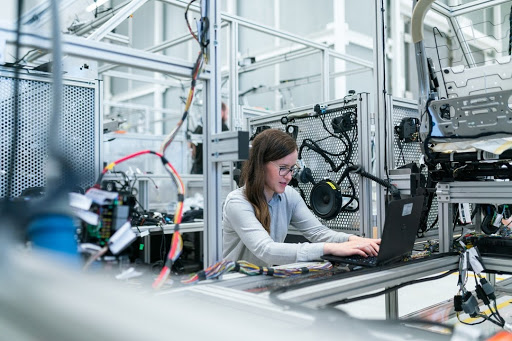Since the start of the first Industrial Revolution, the manufacturing industry has sought to increase automation and efficiency. In the 1700s production was aided by the help of water and steam power. During the 1800s, a second revolution saw the introduction of the assembly line spurred on by electric energy. By the 1960s, the computer age brought about a third Industrial Revolution with programable systems and automation. Today, the fourth Industrial Revolution is taking the automation of manufacturing processes to new levels. Cloud technology, big data, autonomous robots, and the Internet of Things are driving this new revolution. Industry 4.0 is creating highly integrated, fast, automated, and customizable production systems.
Industry 4.0 manufacturing has introduced a wave of optimization into the industry. It is creating flexible smart factories and distribution models that enable machines to capture, store and analyze data through machine-to-machine communication. What this fourth Industrial Revolution aims to do is enable companies to make quicker, smarter decisions, all while minimizing costs. This means that machines are increasingly operating more independently to create a customer-oriented production system that runs on real-time data.
Changes to production, however, only begin to scratch the surface of the Industry 4.0 concept. If companies are willing to adapt to new technologies, all facets of the business model from the factory floor to the front office can be rethought. Collaborative technologies, industrial robots, and automation can contribute to a complete rethinking of the manufacturing industry. Let’s take a look at how Industry 4.0 for manufacturing is changing.
What is Industry 4.0?

Industry 4.0 usually refers to the smart factory that utilizes collaborative technologies such as embedded sensors and wireless connectivity in production machinery and equipment. Smart logistics like automated warehousing, cargo tracking, and remote fleet management can be transformative for companies like GoWholesale who deal with massive amounts of electronic products. These technologies can increase value throughout the complete supply chain.
While the term Industry 4.0 can be broad, it’s driven by the Industrial Internet of Things and cyber-physical systems. These systems are smart and autonomous and can employ computer-based algorithms to observe and influence equipment such as machinery, robots, and vehicles. As a result of these incorporated technologies, the supply chain has received a “smart” makeover. Despite the broadness of the term, there is no denying the impact of Industry 4.0 on the manufacturing industry. This fourth Industrial Revolution has the potential to disrupt the manufacturing process and the products produced.
Constructing a connected supply chain.

Perhaps the biggest change in manufacturing is in creating a smart supply chain. This hinges on having a network of mutually beneficial relationships between suppliers and customers. Embedded sensor technology creates links within the supply chain that allow the various moving parts to communicate, cooperate and adapt in real-time.
Collaboration in Industry 4.0 also relies on an elevated level of transparency and information sharing. Multiple departments, companies, and industries must enable smart communications so that issues can de be addressed in real-time. Industry 4.0 demands that all stakeholders within the entire production process incorporate smart manufacturing and communication.
Building security and protocols and processes.

Manufacturers can’t adopt Industry 4.0 technologies without investing in cybersecurity. Data reveals that the manufacturing industry is at an increased risk for cyber threats. The technologies and cloud computing that are employed by Industry 4.0 can only compound these issues. As a result, manufacturers are incorporating major cybersecurity protocols into their production process. Changes from the factory floor to the front office are needed to protect the entire supply chain.
Industry 4.0 is a completely revolutionary approach to manufacturing processes and technologies. The changes made within the industry will spur global manufacturing to unprecedented levels of optimization and productivity. Aside from industry benefits, customers will also see a new level of customized products and services. Along with connected technologies and processes, however, will come threats and challenges. Manufacturers must continue to adapt to facilitate safe and efficient supply chain management.